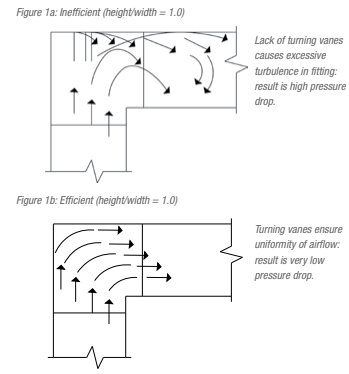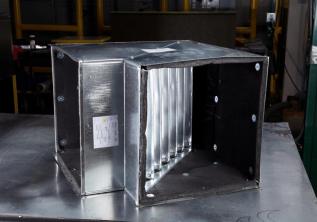When it comes to optimizing the efficiency of HVAC systems, air duct turning vanes play a crucial role. These components are designed to improve airflow by reducing resistance and turbulence as air changes direction within the ductwork. Let’s delve into the significance of air duct turning vanes, their benefits, and their impact on HVAC system performance.

Credit: www.sheetmetaljournal.com
What are Air Duct Turning Vanes?
Air duct turning vanes are sheet metal devices installed inside mechanical ductwork to smoothly direct airflow where there is a change in direction. By doing so, they effectively minimize resistance and turbulence, ensuring a more efficient and stable airflow within the HVAC system.
The Purpose of Air Duct Turning Vanes
The primary purpose of turning vanes in ductwork is to create a smoother change in the direction of airflow. By doing so, they reduce pressure loss and contribute to the overall efficiency of the HVAC system. Without turning vanes, airflow deficiencies can occur, leading to system testing failure and reduced performance.
Benefits of Air Duct Turning Vanes
Utilizing air duct turning vanes offers several benefits, including:
- Improved airflow efficiency
- Reduced pressure loss
- Steadier airflow
- Lower sound pressure
These benefits not only enhance the performance of the HVAC system but also contribute to energy savings and a more comfortable indoor environment.
Choosing the Right Air Duct Turning Vanes
When selecting air duct turning vanes for your HVAC system, consider opting for high-efficiency profile turning vanes such as Aero Dyne, which offer maximum turning efficiency and stability of airflow. It’s essential to choose turning vanes that are designed to meet the specific requirements of your ductwork and HVAC system.
Where to Find Air Duct Turning Vanes
There are various suppliers and manufacturers offering air duct turning vanes, including Ductmate Industries, Conklin Metal Industries, McMaster-Carr, and Distribution International. These providers offer a range of turning vane systems designed to meet diverse HVAC needs.

Credit: aero-dyne.net
Installing Air Duct Turning Vanes
Proper installation of air duct turning vanes is crucial to ensure optimal performance of the HVAC system. Working with experienced HVAC professionals can help ensure that turning vanes are installed correctly and in the most effective locations within the ductwork.
Final Thoughts
Air duct turning vanes are essential components in HVAC systems, contributing to improved airflow efficiency, reduced pressure loss, and overall system performance. By understanding their purpose and benefits, you can make informed decisions when it comes to selecting and installing turning vanes for your HVAC ductwork.
Whether you’re in Austin, Texas or any other location, the importance of air duct turning vanes remains consistent in ensuring the optimal functionality of HVAC systems.
For more information and expert guidance on air duct turning vanes and their impact on HVAC systems, feel free to reach out to HVAC professionals in your area.
Frequently Asked Questions
What Is The Spacing For Turning Vanes?
The recommended spacing for turning vanes is typically between 6 to 8 inches. This spacing helps ensure optimal airflow direction and reduces turbulence, enhancing the efficiency of the HVAC system. For precise spacing guidelines, consult the specific requirements of your ductwork design.
What Is The Purpose Of Turning Vanes In Ductwork?
Turning vanes in ductwork help create a smoother airflow direction change, reducing pressure loss for more efficient systems.
Do You Need Turning Vanes In Return Ducts?
Turning vanes are crucial in return ducts to ensure efficient airflow, minimize pressure loss, and pass system testing successfully. Choose Aero Dyne High Efficiency Profile Turning Vanes for optimal turning efficiency and steady airflow with reduced sound pressure.
How Much Do 90 Degree Elbows Affect Air Flow?
90 degree elbows can significantly affect air flow, causing turbulence and resistance which can lead to pressure loss and inefficiency. The use of turning vanes, sheet metal devices inside mechanical ductwork, can help to smoothly direct air and reduce resistance and turbulence.
Turning vanes are a necessary and important component to an efficient HVAC system.
